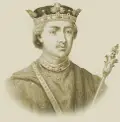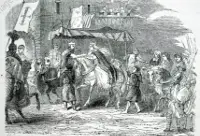King Henry II of England
Henry II is one of England's most well-known monarchs. A powerful personality and ruler, he was the father of two kings and the grandfather of one. His wife, Eleanor of Aquitaine, was famous in her own right. His judicial reforms formed the basis of English Common Law. He also gifted to his sons a stable set of lands known as the Angevin Empire. 
Henry was born on March 5, 1133, in Le Mans, Anjou, in France. He was the son of the Empress Matilda–who would soon be engaged in a very uncivil war for succession to the throne, a period known as The Anarchy– and Count Geoffrey Plantagenet of Anjou, in France. Henry's grandfather, King Henry I, died in 1135, and Matilda tried to cash in on a promise that her father had convinced his barons to make, that they would support her right to rule. That didn't happen. Instead, Henry's nephew Stephen seized the throne and kept it but not without a fight. Henry had red hair and freckles and a fiery temper. Smart with a ready thirst for knowledge, he was 9 when his mother sent him to Bristol to be tutored. It was the first of a number of periods of study with famous academics; he soon knew three languages (English, French, and Latin). His teenage years were full of strife, as his mother inserted him into the fray. He was 14 when he led a band of mercenaries on a sorty across the eastern coast of England. This was after his mother had performed two daring escapes from Stephen's clutches but, after seeing her fortunes wane, had gone home to Normandy. Henry was involved in several more skirmishes but didn't win any major battles. He did command a sizable fighting force, and Stephen in his later years wanted a successor. So the two men came to terms at Wallingford Castle, in an agreement that came to be known as the Treaty of Winchester, since that was where it was publicly acknowledged. Henry agreed to no longer contest Stephen's right to rule, and Stephen agreed that Henry would succeed him on the throne. When Stephen died in 1154, Henry did just that. He and Eleanor were crowned on December 19 at Westminster. France at this time was not a united country but a collection of duchies and counties and other kinds of powerful lands. Normandy, where Matilda was from, was one such land. Neighboring Anjou, where Henry's father, Geoffrey, was from, was another. France had a king, Louis VII, but he didn't rule over all of what is now France.  Geoffrey had named Henry Duke of Normandy in 1150, essentially uniting Anjou and Normandy; Geoffrey was also head of the County of Maine, and this title passed to Henry when his father died. This gained the enmity of King Louis VII of France. This king had married Eleanor of Aquitaine in 1137, when she was 15; they did not have any sons, and Louis, wanting a male heir, decided to end the marriage, in 1152. She then got married again, to Henry, just eight weeks later. Thus, when Henry Duke of Normandy (and ruler of Anjou) became King of England, he also reigned over multiple parts of what is now France. As part of the agreement that ended Eleanor's marriage to Louis, he kept the two daughters that they had between them and Eleanor got the rule of Aquitaine and Poitou. Aquitaine by itself was rather large and rich, and Henry was the lord and the Eleanor the lady over a large amount of territory. Next page > Triumphs and Tragedies > Page 1 2 |
|




